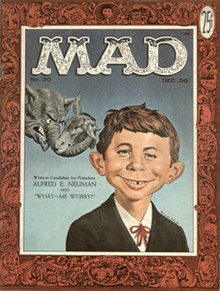Na, tudod-e mi az, ami a
bűnözésnél is kifizetődőbb? A fordításhoz nem kell nagyon
haladónak lenned (legalábbis ha tudsz már bánni az igeidőkkel.)
segítség a nyelvtanhoz:
* igeidők (videó)
* is, szintén_mondatok
Wikipedia:
Alfred E. Neuman is the fictitious mascot and cover boy of Mad, an
American humor magazine. The face had drifted through U.S.
pictography for decades before being claimed by Mad editor Harvey
Kurtzman, and later named by the magazine's second editor Al
Feldstein. He appeared occasionally in the early seasons of MADtv
during sketches and interstitials and briefly appeared in the
animated TV series Mad.
Since his debut in Mad, Neuman's likeness has appeared on the cover of all but a handful of the magazine's 500 issues, distinguished by jug ears, a missing front tooth, and one eye lower than the other. His face is rarely seen in profile; he has virtually always been shown in front view, directly from behind, or in silhouette. Harvey Kurtzman first spotted the image on a postcard pinned to the office bulletin board of Ballantine Books editor Bernard Shir-Cliff. "It was a face that didn't have a care in the world, except mischief," recalled Kurtzman. Shir-Cliff was later a contributor to various magazines created by Kurtzman...
Since his debut in Mad, Neuman's likeness has appeared on the cover of all but a handful of the magazine's 500 issues, distinguished by jug ears, a missing front tooth, and one eye lower than the other. His face is rarely seen in profile; he has virtually always been shown in front view, directly from behind, or in silhouette. Harvey Kurtzman first spotted the image on a postcard pinned to the office bulletin board of Ballantine Books editor Bernard Shir-Cliff. "It was a face that didn't have a care in the world, except mischief," recalled Kurtzman. Shir-Cliff was later a contributor to various magazines created by Kurtzman...
When
Al Feldstein took over as Mad's editor in 1956, he seized upon the
face: I decided that I wanted to have this visual logo as the image
of Mad, the same way that corporations had the Jolly Green Giant and
the dog barking at the gramophone for RCA. This kid was the perfect
example of what I wanted. So I put an ad in the New York Times that
said, "National magazine wants portrait artist for special
project". In walked this little old guy in his sixties named
Norman Mingo, and he said, "What national magazine is this?"
I said “Mad,” and he said, "Goodbye." I told him to
wait, and I dragged out all these examples and postcards of this
idiot kid, and I said, "I want a definitive portrait of this
kid. I don't want him to look like an idiot — I want him to be
loveable and have an intelligence behind his eyes. But I want him to
have this devil-may-care attitude, someone who can maintain a sense
of humor while the world is collapsing around him." I adapted
and used that portrait, and that was the beginning.

